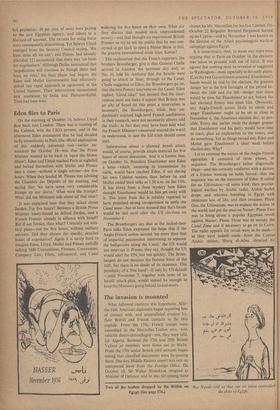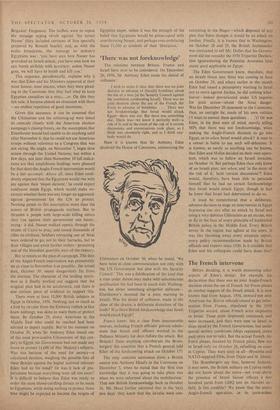The invasion is mounted
What followed confirms this hypothesis. After the 16th American diplomats began reporting loss of contact with, and unparalleled evasion by, their British and French contacts in the two capitals. From the 17th, French troops were assembled in the Marseilles-Toulon area, with vehicles desert-camouflaged—not, they were told, for Algeria. Between the 17th and 29th British Valiant jet bombers were flown out to Malta. From the 17th senior British civil servants began noting that classified documents were by-passing them. One key Middle Eastern expert was sent on unexpected leave from the Foreign Office. On October 18, Sir Walter Monckton resigned as Minister of Defence; and he was not among those Two of the leaflets dropped by the British on 'But Nasser told us that our air force controlled Egypt. (See page 576.) the skies of Egypt.' chosen by Mr. Macmillan for his first Cabinet. On October 22 Brigadier Bernard Fergusson turned up on Cyprus—and by November 1 was known as the director of the Allied psychological warfare campaign against Egypt.
It is unnecessary, then, to waste any more time arguing that in Paris on October 16 the decision was taken to proceed with use of force. It was agreed that nothing must be revealed or suggested to Washington—most especially in the early phase. If, as the two Governments assumed, Eisenhower's hands would be tied by the election, the greatest danger lay in the first fortnight of the period be- tween the 16th and the 6th—danger that there would be time for Eisenhower to act, before the last electoral frenzy was upon him. Obviously, any Anglo-French action likely to alarm and anger Eisenhower ought to be set as close to November 6, the American election day, as pos- sible. Every day earlier made the danger greater that Eisenhower and his party would have time to react, plan an explanation to the voters, and do something. Yet as things turned out, Eden and Mollet gave Eisenhower a clear week before election day. Why?
Let us examine the nature of the Anglo-French operation. It consisted of three phases, in sequence. The Brombergers rather disgustedly allege—and this certainly conforms with a picture of a France wanting no holds barred—that the sequence was on the insistence of Eden. It called for an Ultimatum—of some kind; then psycho- logical warfare by Arabic radio, Arabic leaflet drops, and selective bombing in Egypt with minimum loss of life; and then invasion. Phase One, the Ultimatum, was to explain the action to the world, and put the onus on Nasser; Phase Two was to bring about a popular Egyptian revolt against Nasser; Phase Three was to occupy the Canal Zone and if necessary to go on to Cairo. The radio appeals for revolt were to be made— as they were indeed made—from the Cyprus Arabic station, Sharq al-Adna. directed by Brigadier Fergusson. The leaflets were to repeat the message urging revolt against 'the tyrant Nasser' (they included cartoons of him specially prepared by Ronald Searle); and, as with the radio broadcasts, the message to ordinary Egyptians was: 'you have seen how Nasser has provoked an Israeli attack; you have seen how we can bomb airfields with accuracy; unless Nasser goes, we will have to bomb and kill you.'
This sequence, paradoxically, explains why it was that Eden and his Ministers appeared at their most honest, most sincere, when they were plead- ing in the Commons that they had tried to keep Egyptian casualties to a On this they felt safe; it became almost an obsession with them —an endless repetition of good intentions.
Given this sequence, it can be assumed that the Ultimatum and the softening-up were timed to coincide closely with the American election campaign's closing frenzy, on the assumption that Eisenhower would feel unable to do anything until after November 6; that he could not use American troops without reference to a Congress that was not sitting. He might, on November 7, begin slow action through the United Nations; but within a few days, not later than November 10 (all indica- tions are that amphibious landings were planned for that date) the Anglo-French intervention would be a fait accompli. Above all, since Eden confi- dently expected that the Egyptians would rise with joy against their 'tinpot dictator,' he could expect confusion inside Egypt, which would make un- certain whether there was any longer an aggressed- against government for the UN to protect. Nothing points to this assumption more than the nature of British propaganda warfare. But to threaten a people with large-scale killing unless they rise against their government can boom- erang : it did. Nasser walked openly through the streets of Cairo to pray, and issued thousands of rifles to civilians. Soldiers retreating out of Sinai were ordered to go, not to their barracks, but to their villages and await further orders—promising one of the bloodiest guerrilla wars of the century.
But to return to the plan of campaign. The date of the Anglo-French intervention was presumably set as close to November 6 as possible : the actual date, October 30, seems dangerously far from the election. The character of the landing opera- tion as it finally worked out suggests that the original plan had to be accelerated, and there is one curious piece of evidence to support this.
There were at least 11,000 British subjects in Egypt in October, 1956, Nothing, not so much as a hint by circular from the Embassy (which in fact knew nothing), was done to warn them or protect them. By October 29, every American in the Middle East who could be reached had been advised to depart rapidly. But -at the moment on October 30, when Sir Anthony Eden issued one of the most provocative Ultimatums of this cen- tury to Egypt, his Government had not made any move to protect 11,000 of Her Majesty's subjects. Was this because of the need for secrecy—a calculated decision, weighing the possible fate of these Britons against the higher national interests Eden had on his mind? Or was it lack of pre- paredness because everything went off too soon? It is difficult to believe that Eden was ready to order the most blood-curdling threats to be made to Egyptians, while doing nothing to protect those who might be expected to become the targets of Egyptian anger, unless it was the strength of his belief that Egyptians would be preoccupied with overthrowing Nasser, and perhaps even embracing those 11,000 as symbols of their 'liberation.'











































 Previous page
Previous page